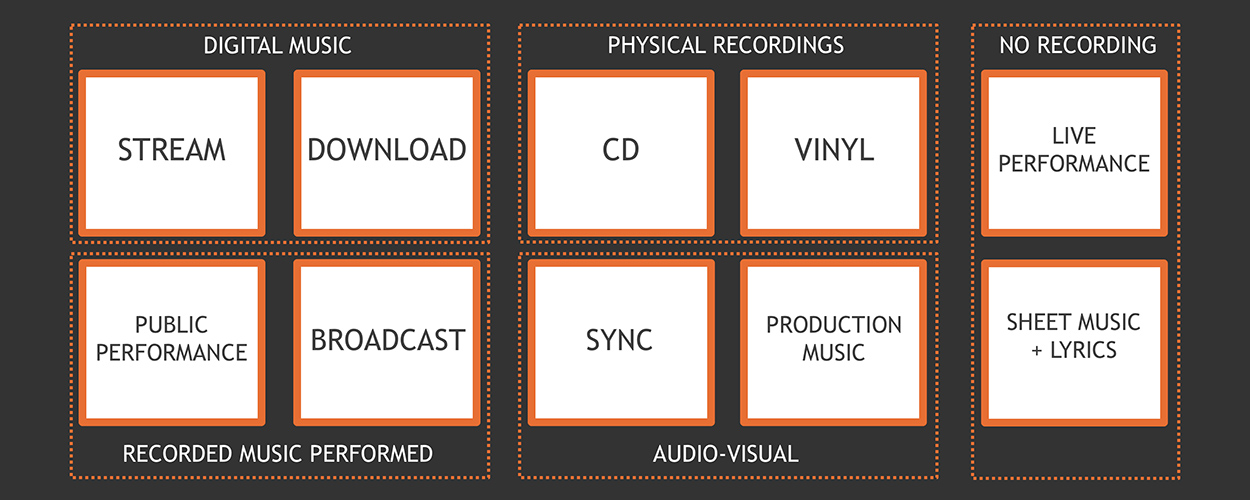CMU LIBRARY
The Music Publishing Sector
Resources about the music publishing sector

The music publishing sector is the strand of the wider music industry focused on the management and monetisation of song rights, working with songwriters and composers to create and exploit songs and compositions.
COLLECTING SOCIETIES
For many songwriters, the first business partner in the music publishing sector is actually their local song rights collecting society.
Collective licensing is employed much more prolifically with song rights compared to recording rights, and songwriters often actually ‘assign’ (so transfer ownership) elements of their song copyrights to their society, in particular the performance, communication and making available controls, often referred to together as the performing rights.
In some countries there are separate collecting societies representing the performing rights and the mechanical rights in songs. That is the case in the UK, where PRS represents performing rights and MCPS mechanical rights. Although the two UK societies work very closely together, with PRS actually administrating any licences issued by MCPS.
MUSIC PUBLISHERS
Many songwriters also work with music publishers. These are companies that seek opportunities for the songwriter to collaborate with other music-makers; pitch the writer and their music to labels, and to movie, game or ad producers looking to commission or synchronise music for their productions; and oversee all of the administration involved in monetising song rights.
Some publishers also negotiate direct deals with streaming services rather than relying on the collective licensing system in that domain.
PUBLISHING DEALS
Publishers will usually take control – and possibly ownership – of those elements of a writer’s song copyrights not already assigned to a society. They will also have a contractural right to collect the ‘publishers share’ of any money generated by societies linked to the writer’s songs. Any monies the publisher then generates from the song rights will be shared with the writer.
ADMINISTRATING SONG RIGHTS
One key feature of songs – compared to other creative works – is the high frequency with which any one song may be used by a third party.
Successful songs will be performed and/or recorded by countless artists and musicians, including amateur performers, potentially all over the world.
This is both an opportunity and a challenge – the songwriter and their publisher will be due payment for most of those usages, but tracking all those disparate and diverse uses is a major administrative task.
Some smaller publishers outsource that administration work to a larger publisher or to a company that specifically provides rights admin services. Some songwriters might also hire the services of a rights admin company instead of signing with a more conventional publisher.
CO-OWNERSHIP OF SONG RIGHTS
Another challenge with song rights is co-ownership. When songwriters collaborate they share the resulting copyright. Each writer may then be working with a different collecting society and music publisher.
When a co-owned song is used, monies need to be shared out between the co-owners. In those scenarios where collective licensing does not apply, the user of music will also need to secure a separate licence from each co-owner.
PRODUCTION MUSIC
One last important component of the music publishing sector is production music. This is music that is composed and recorded to be used in audio-visual productions – but not specific audio-visual productions.
Production music companies have libraries of such music ready for TV, movie, gaming and advertising companies to use as an alternative to commissioning something original or licensing a commercially released track.
Although these are libraries of recordings, production music nevertheless tends to sit within the music publishing sector.
MAJORS & INDIES
All three of the major music rights groups are involved in music publishing – so that’s Universal Music Publishing, Sony Music Publishing and Warner Chappell Music Publishing. There are then many independent music publishers – and providers of music publishing and rights administration services – including bigger players like BMG, Kobalt, Peermusic, Wixen, Concord, Downtown, Bucks, Sentric and others. The collecting societies are also more powerful on the songs side of the business.
MUSIC PUBLISHING REVENUES
The music publishing sector makes money whenever the record industry makes money, including when recorded music is streamed, downloaded, sold on discs, broadcast, played in public, or synchronised into movies, games or ads. But songwriters and publishers also earn when music is performed live, and from selling – or otherwise monetising – sheet music and lyrics (which is why we call this part of the industry music publishing).
You will find coverage of key developments in and announcements from the music publishing sector in the Labels & Publishers section of CMU.
Guides, reports and briefings from the CMU Insights consultancy unit…
The Music Copyright Explained guide from CMU Insights and the UK’s Intellectual Property Office provides a comprehensive beginner’s guide to how music copyright works – including the song rights.
The Digital Dollar Song Royalties Guide from CMU Insights and the UK’s Music Managers Forum explains the extra compexities that occur in the way song rights are licensed to streaming services and the impact that has on how song royalties are processed and songwriters are paid.
The Digital Dollar Song Royalties Manifesto from CMU Insights and the UK’s Music Managers Forum proposes a new way of licensing song rights and processing song royalties in the streaming domain to address many of the issues songwriters currently face.
MPA is the trade body for the UK music publishing sector.
Ivors Academy is the organisation for songwriters and composers in the UK.
MMF is the trade body for artist, writer and producer managers in the UK.
PRS For Music is the collecting society for song rights in the UK.
This web page explains the difference between PRS and MCPS.
ICMP is the global trade group for the music publishing sector.
CISAC is a global grouping of songwriter collecting societies.
GESAC is a pan-European grouping of songwriter collecting societies.
LAST UPDATED: July 2022




